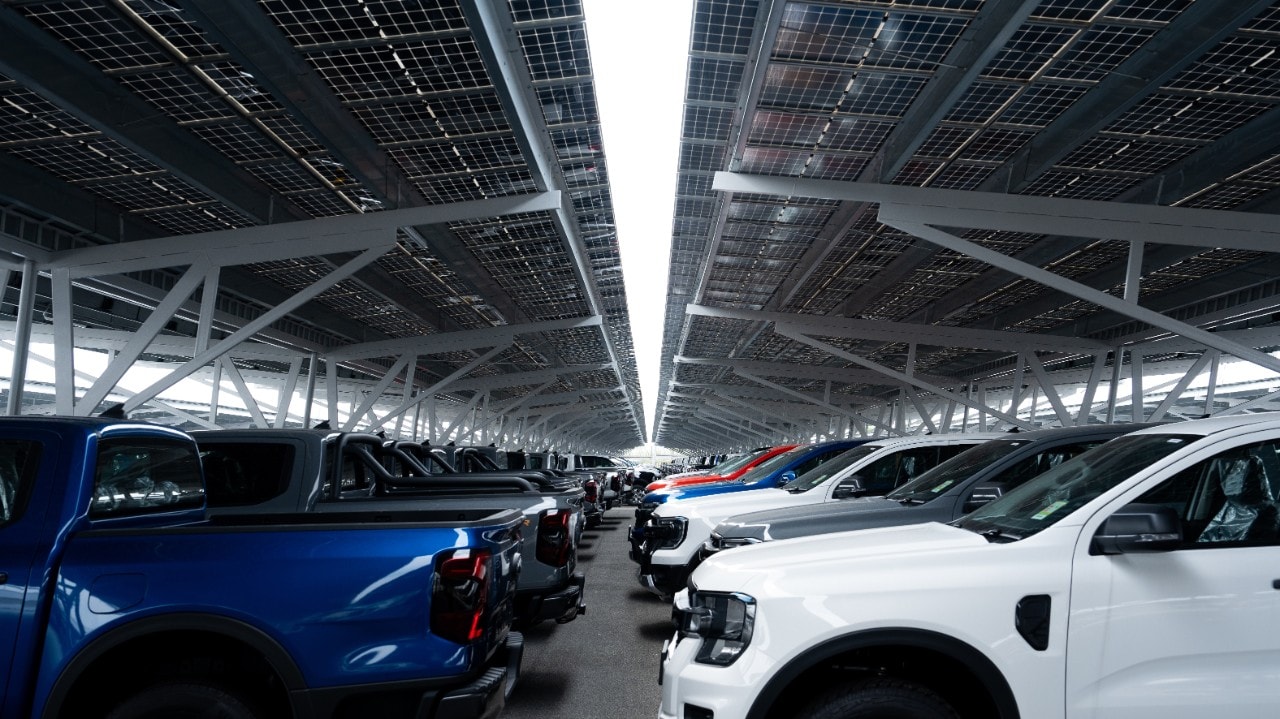

Ford Motor Company is making significant strides toward a more sustainable, inclusive, and equitable transportation future. One of its key initiatives is the commitment to source 100% carbon-free electricity for its global manufacturing operations by 2035. As of 2023, Ford has achieved an impressive 70.5% of carbon-free electricity usage in its global manufacturing processes, showcasing its dedication to environmental stewardship and innovation.
At the heart of Ford's renewable energy efforts are its production facilities for the Ranger and Everest models in South Africa and Thailand. These sites are instrumental in helping Ford meet its ambitious sustainability goals, primarily through the innovative use of solar power. Notably, Ford has established the largest solar canopy carparks in Africa at its Silverton Assembly Plant and in Thailand at Ford Thailand Manufacturing (FTM).
Andrea Cavallaro, Ford's director of operations for the International Market Group, highlighted the strategic advantage of these solar canopy carparks. "Solar canopy carparks are an incredibly exciting opportunity for Ford as they allow us to make use of spaces that would otherwise have limited use," Cavallaro explained. These canopies not only provide essential shelter for finished vehicles but also harness solar energy to power nearby facilities.
Ford's Silverton Assembly Plant in Pretoria features a 13.5-megawatt solar carport capable of accommodating over 3,500 vehicles. Completed in 2022, this installation now supplies 18% of the electricity required for Ranger production. This solar power contributes to the manufacturing of more than 20,800 Rangers annually, demonstrating the significant impact of renewable energy on Ford's operations.
Similarly, at the Ford Thailand Manufacturing facility, a recently activated 7.7-megawatt solar carport provides shelter for over 1,500 vehicles. This installation reduces carbon dioxide (CO2) emissions by more than 5,700 tons annually and supplies up to 20% of the energy needed to produce each Ranger and Ranger Raptor. As a result, approximately 21,000 Rangers and Ranger Raptors can be built each year using solar power alone at FTM.
Ford's commitment to renewable energy doesn't stop with solar carports. Auto Alliance Thailand has announced plans to construct an 8-megawatt floating solar energy array near its Rayong facility. Scheduled to go online in September, this project is expected to offset over 5,400 tons of CO2 emissions per year. This new initiative will complement the existing 6-megawatt solar project at the plant, making Auto Alliance Thailand Ford's largest user of solar energy in the region, with a combined capacity of 14 megawatts.
Ford's focus on environmental quality extends beyond its use of renewable energy. The company is committed to conserving water, reducing waste, and transitioning to carbon-free electricity across all its manufacturing processes. These efforts are part of Ford's "Road to Better" initiative, which aims to build a more sustainable, inclusive, and equitable transportation future.
Cavallaro emphasized the broader impact of these initiatives, stating, "At Ford, we’re focused on environmental quality; both in terms of what we build and how we build. We’ve continued to push ourselves to conserve water, reduce waste, and transition to carbon-free electricity in manufacturing. Initiatives like solar canopy carparks and floating solar farms are an incredibly vital part of our Road to Better commitment, which helps build a more sustainable, inclusive, and equitable transportation future."
The innovative use of otherwise inert spaces, such as car parks, for photovoltaic systems highlights Ford's strategic approach to sustainability. These solar canopies and floating solar farms provide dual benefits: they generate renewable energy and offer practical advantages like vehicle shelter. This dual-purpose approach reduces reliance on fossil fuels and supports Ford's ongoing efforts to create a better world.
Cavallaro summarized the significance of these projects, stating, "That these systems can make use of otherwise inert space and contribute in a very real way to our production needs, while reducing our reliance on fossil fuels for energy, is an important contribution in our ongoing ambition to help build a better world."
Ford's achievements in renewable energy are a testament to its commitment to sustainability and innovation. By leveraging solar power and other renewable sources, Ford is not only reducing its environmental footprint but also setting a standard for the automotive industry. As the company continues on its path to sourcing 100% carbon-free electricity by 2035, these initiatives serve as a model for how businesses can contribute to a sustainable future.
If you want to stay up to date on all of the latest news and updates from Ford, be sure to follow along on the Brian Hoskins Ford blog! You can also check out our available inventory online to see what we currently have available.